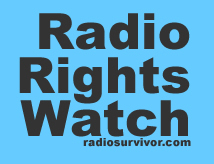 Reading the Miami Herald’s piece on Haiti’s 40 or so community radio stations, I kept wondering to myself, are they legal or not? The article says these signals are “difficult to locate” and have “no official listings and, under Haitian law, the stations do not exist.”
Reading the Miami Herald’s piece on Haiti’s 40 or so community radio stations, I kept wondering to myself, are they legal or not? The article says these signals are “difficult to locate” and have “no official listings and, under Haitian law, the stations do not exist.”
So they’re not exactly pirate but they’re not really legitimate either. The good news is that Haiti’s version of our Federal Communications Commission, the National Commission for Telecommunications (NCT), wants Haiti’s parliament to recognize them as legal, outlining their rights and responsibilities. But “many stations will still have a hard time getting licenses because of a lack of sponsorship and other economic challenges.”
The NCT has been working on this issue for [sigh] nine years. It seems like this matter ought to be addressed by Haiti’s lawmakers as soon as possible. Radio played a heroic role in the terrible Haitian earthquake of 2010 and was recognized for its contributions in a subsequent Knight Foundation Report.
From the report:
“The media development community should prioritize restoring local radio’s broadcast capacity and ensure that local media are given support to adequately respond in a crisis. As new platforms and technologies expand and are tested, it should not be forgotten that local radio still stands as a primary source of information for the overwhelming majority of the world’s population.”
Meanwhile, South Africa says that it has now licensed over 140 community radio stations, and, “many of them are operating,” according to government communications minister Faith Muthambi, who has definitely mastered her communications regulatory jargon.
“Together with entities, and Portfolio Committee on Communications in the short period we have managed to create an alignment and synergies to advance important policies;” she told SAnews.gov.za, “from the gazetting of the Broadcasting Digital Migration policy to the Community Broadcasting Support Scheme policy.”
Now I have to add “gazetting” to my lexicon of communications buzzwords. Anyway, I’m going with my hunch that she thinks these community radio stations are a good thing. “We are working tirelessly to review their funding models to ensure long term-financial viability of these institutions as they carry their mandates respectively,” Muthambi added.


